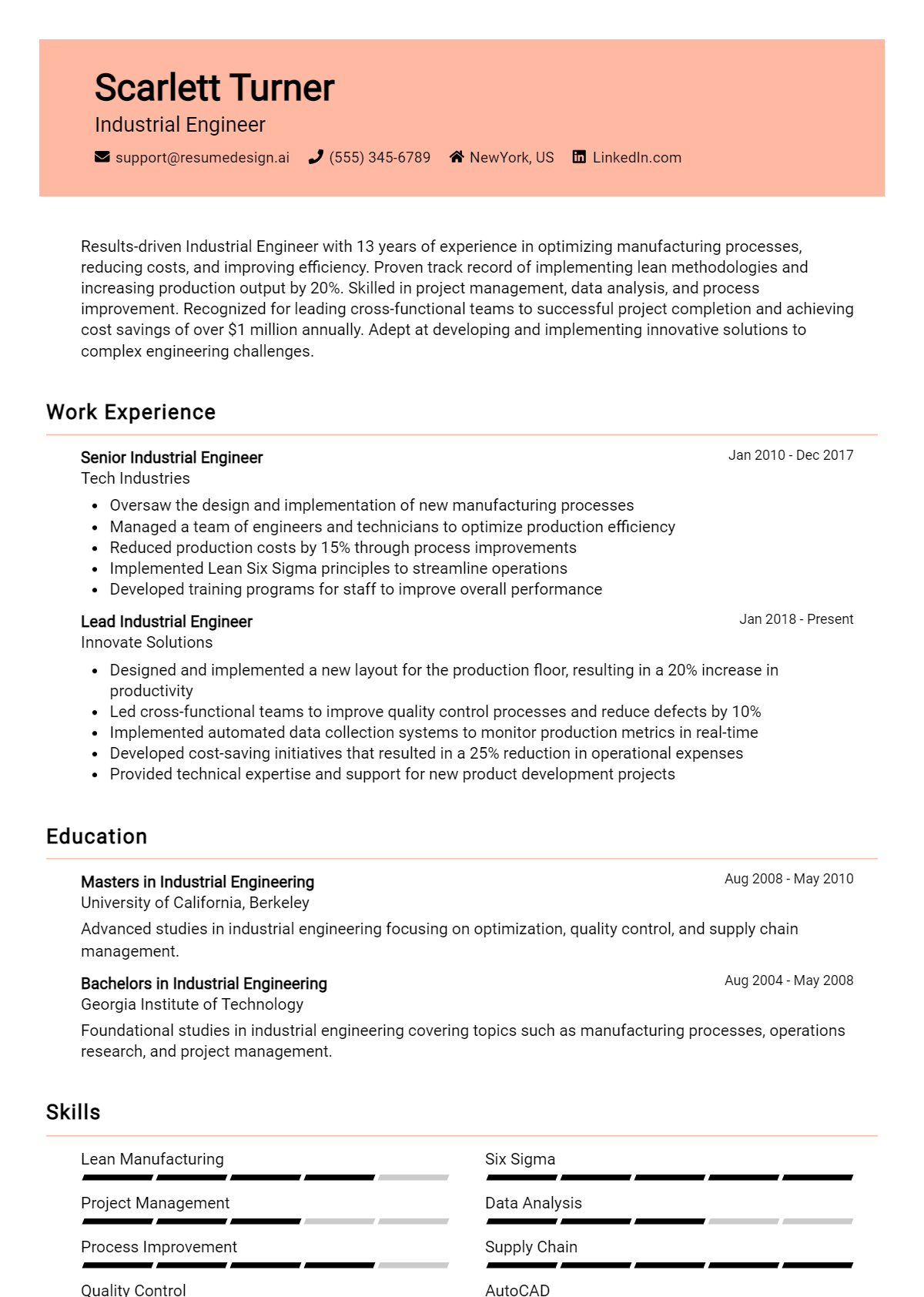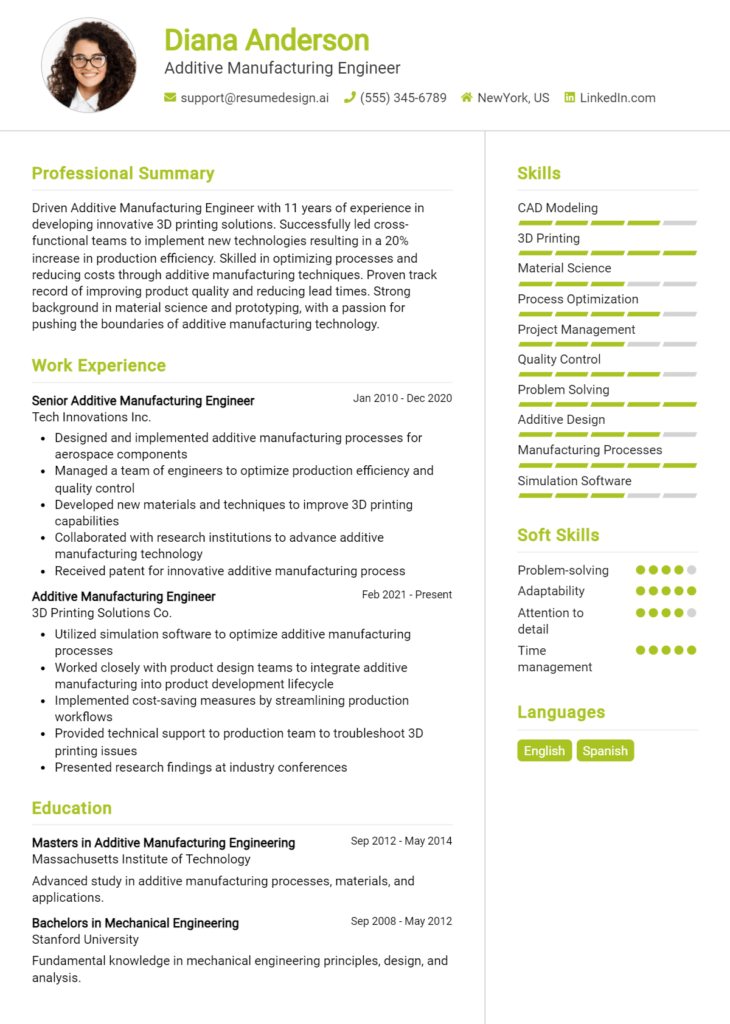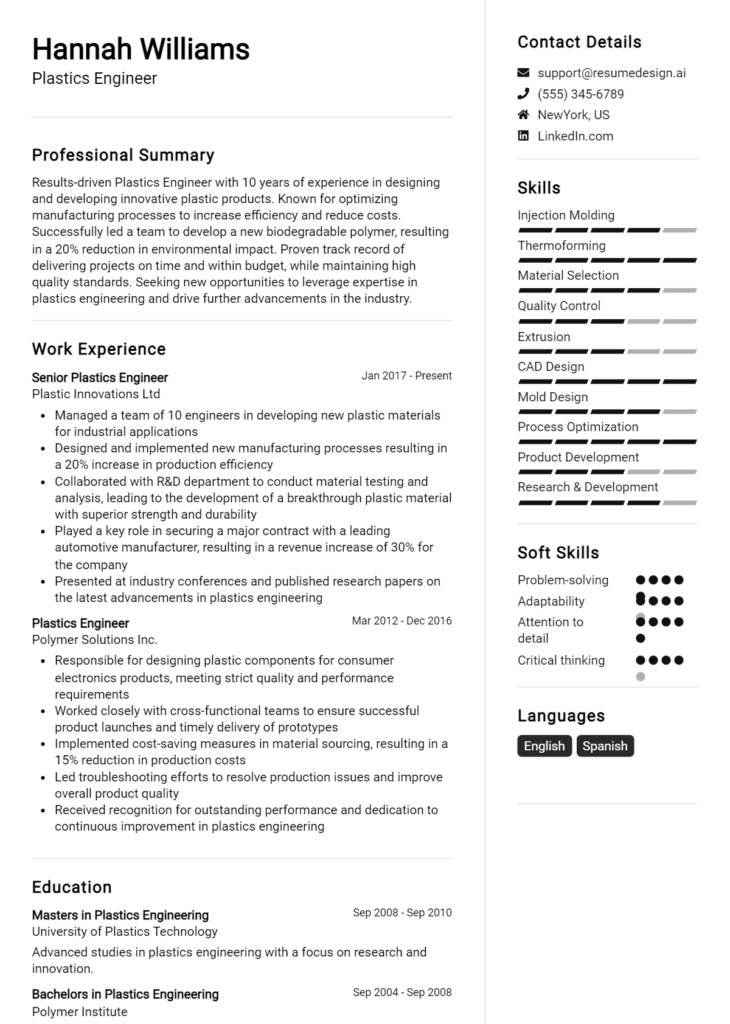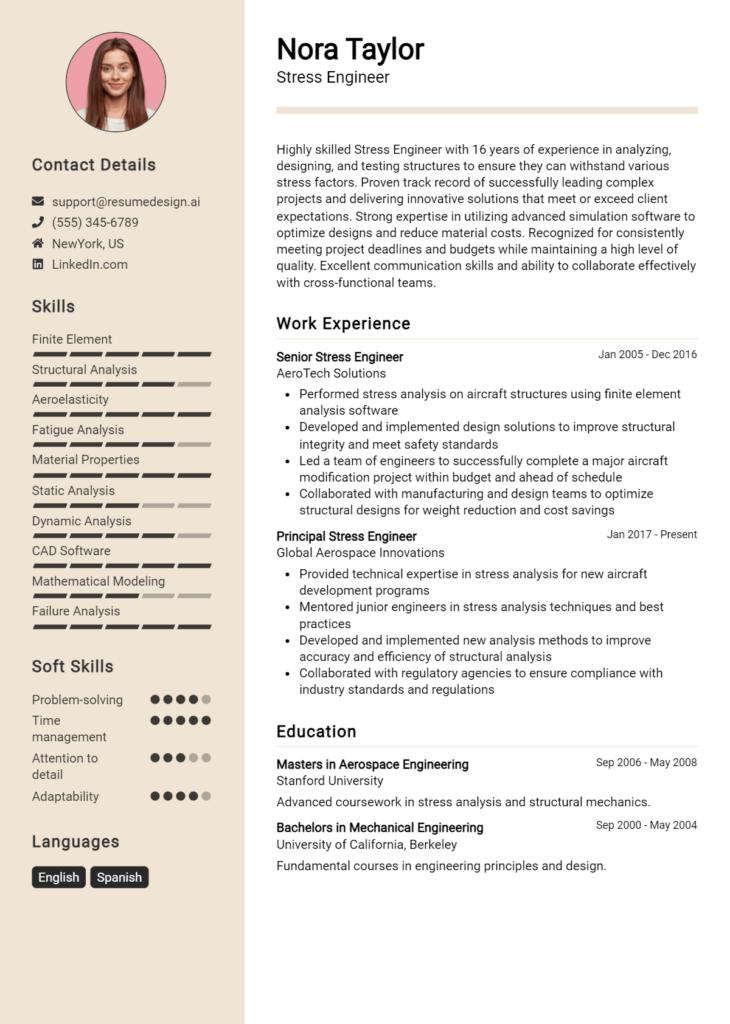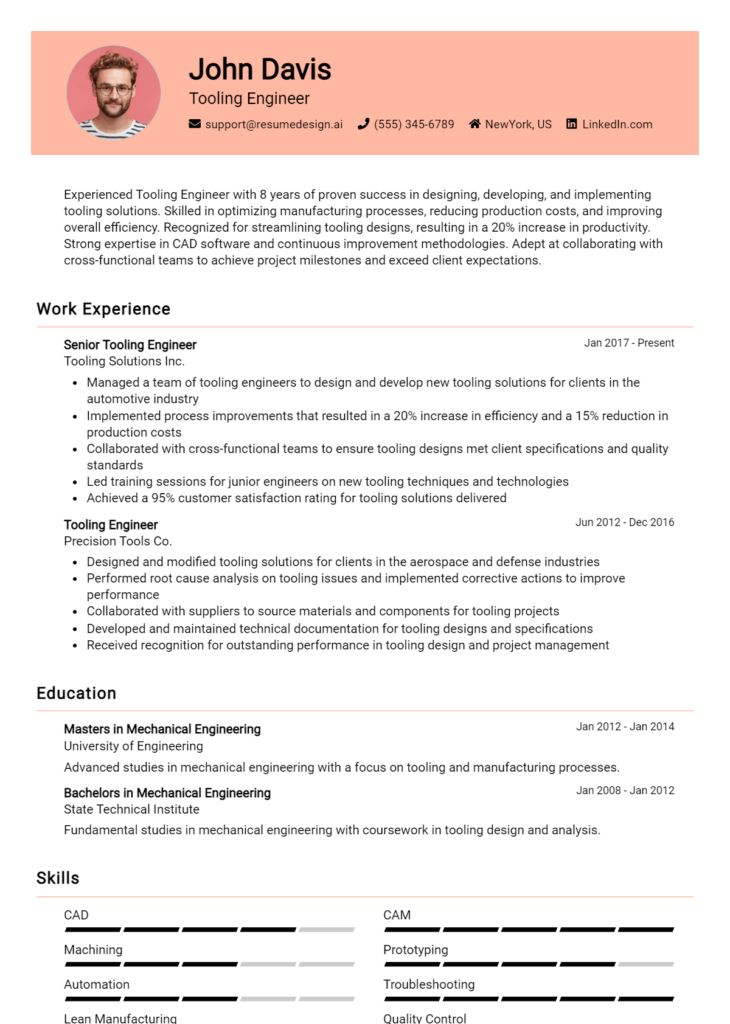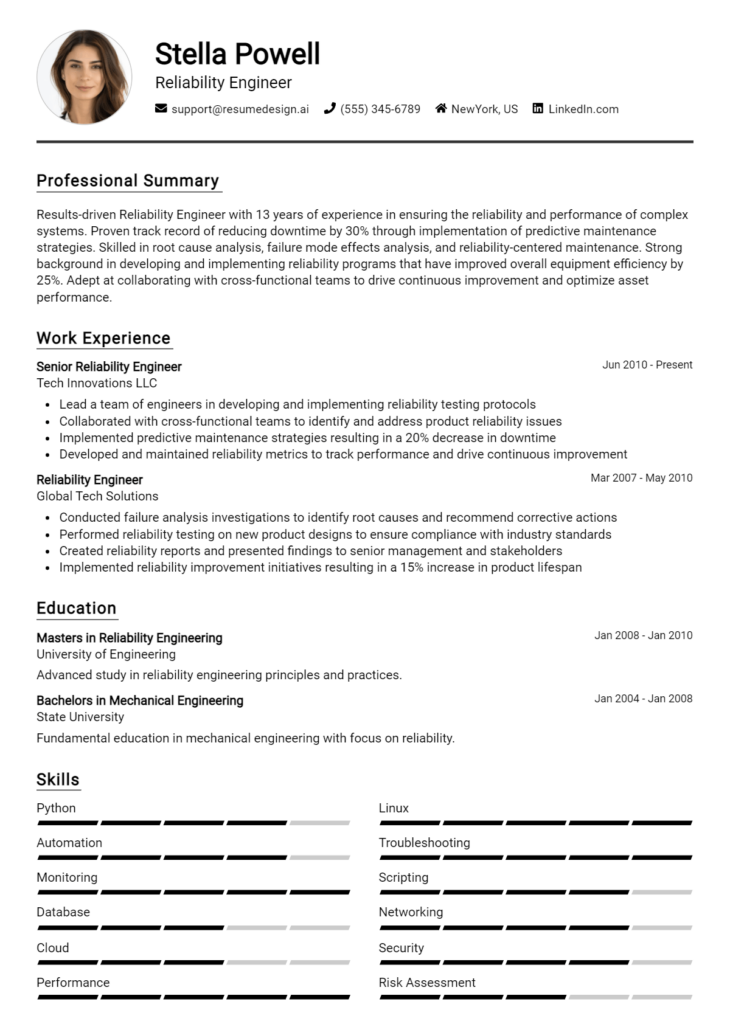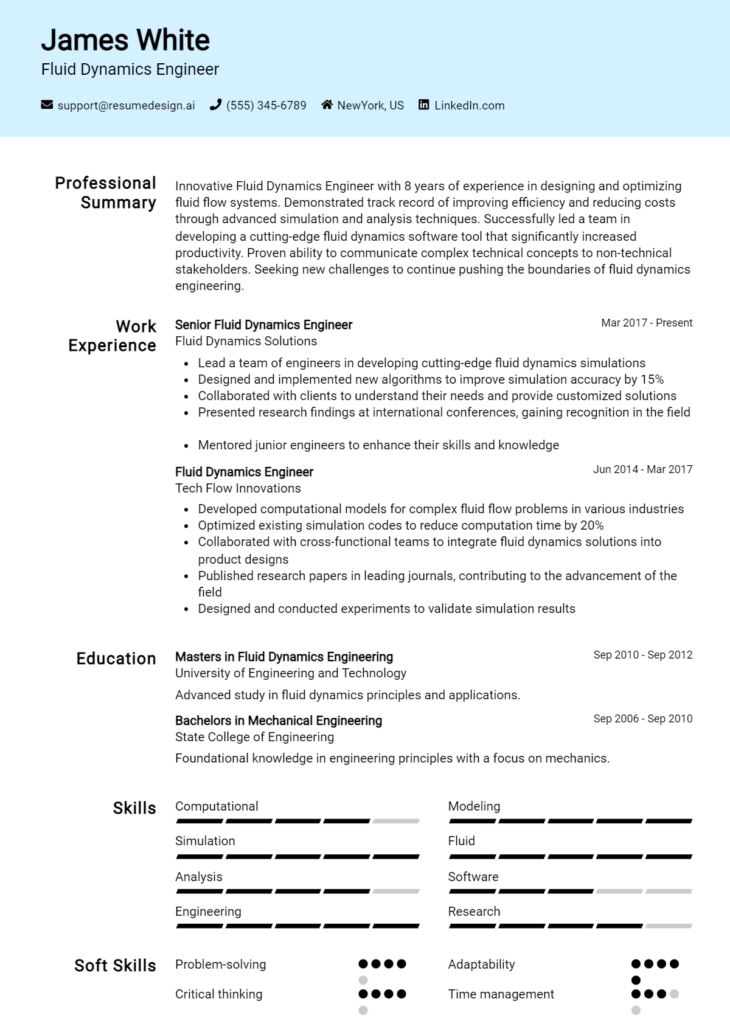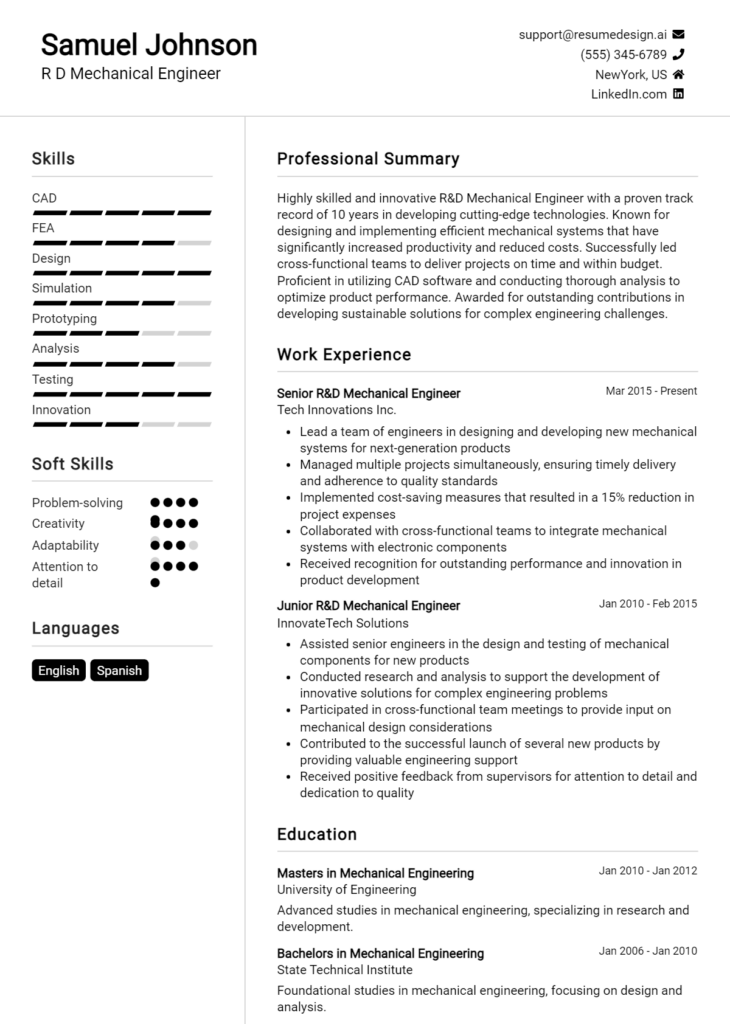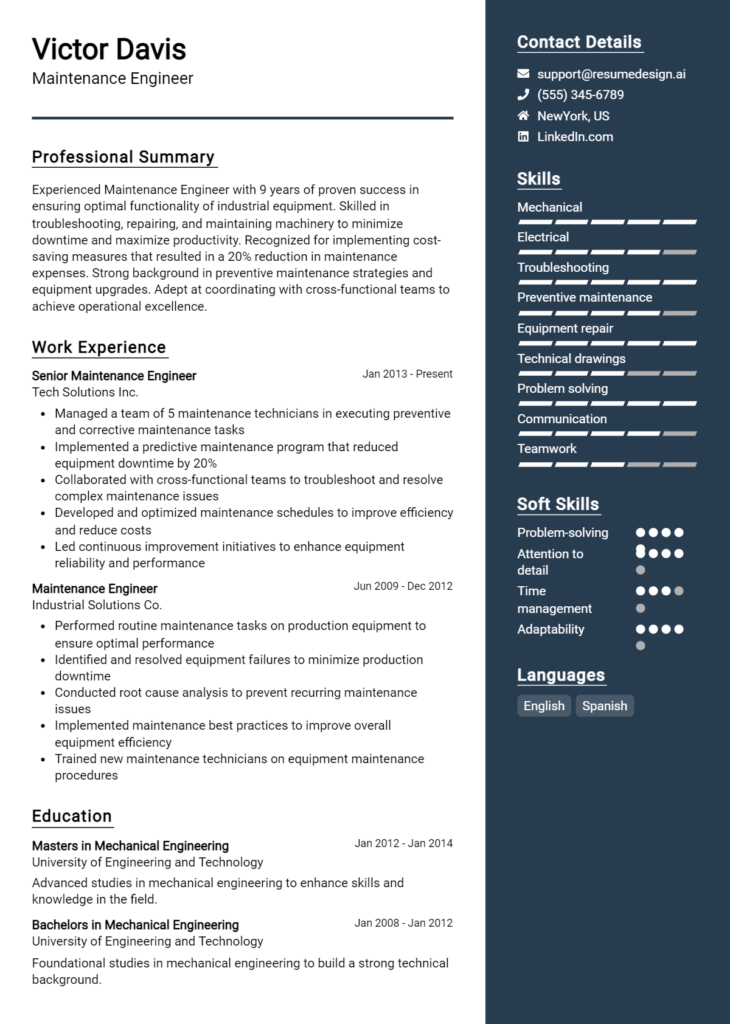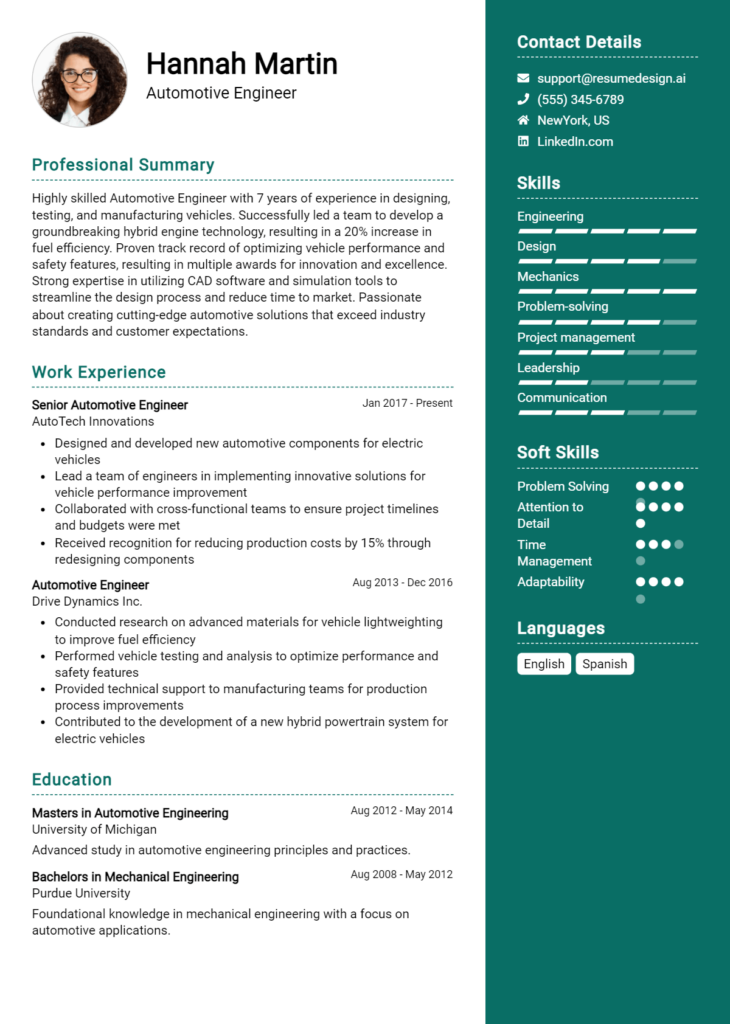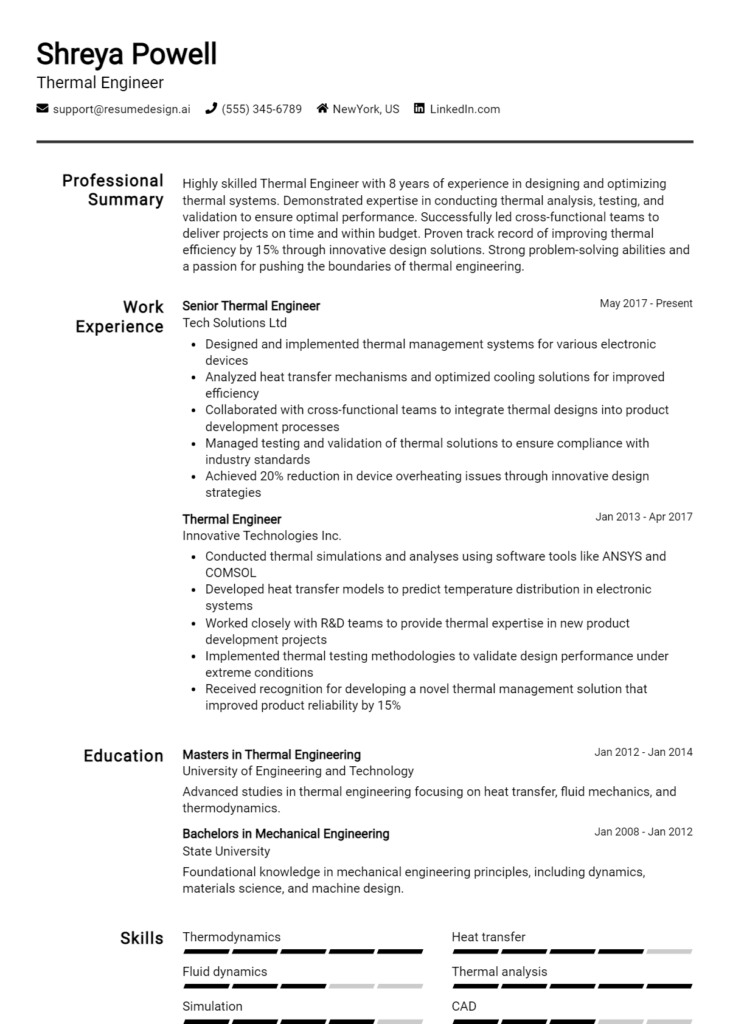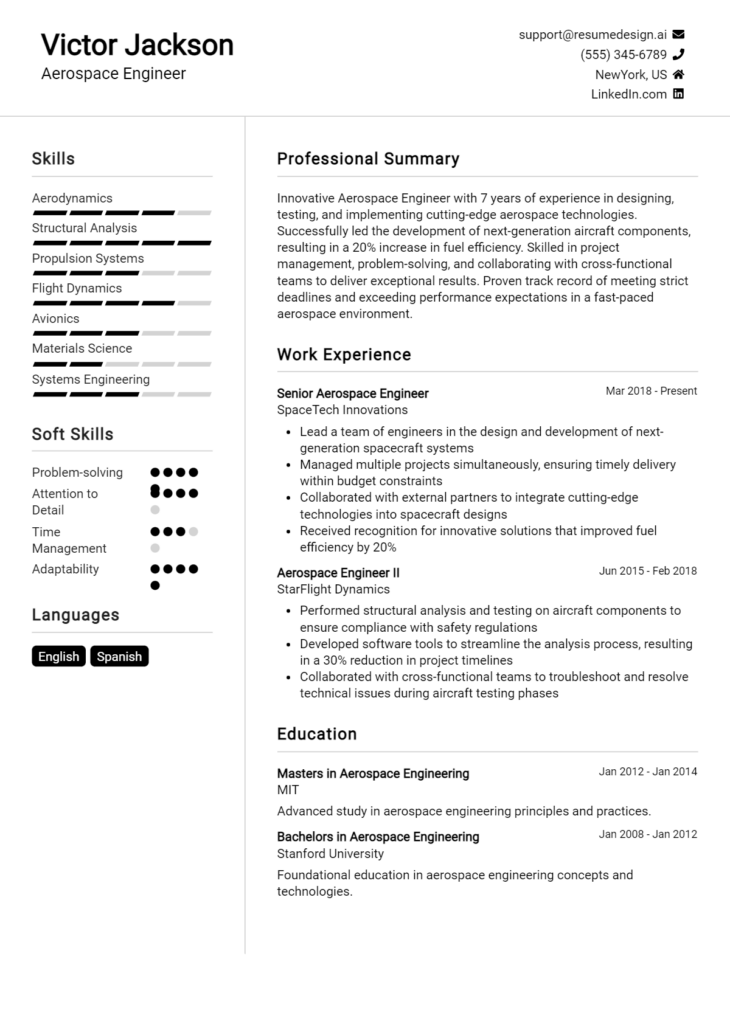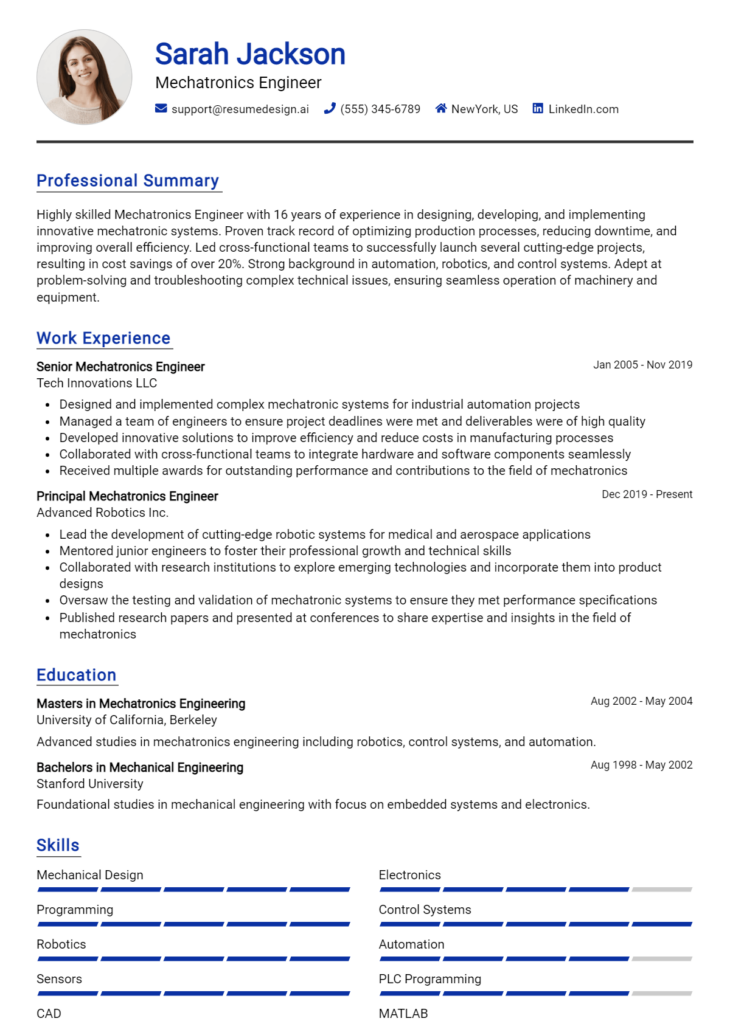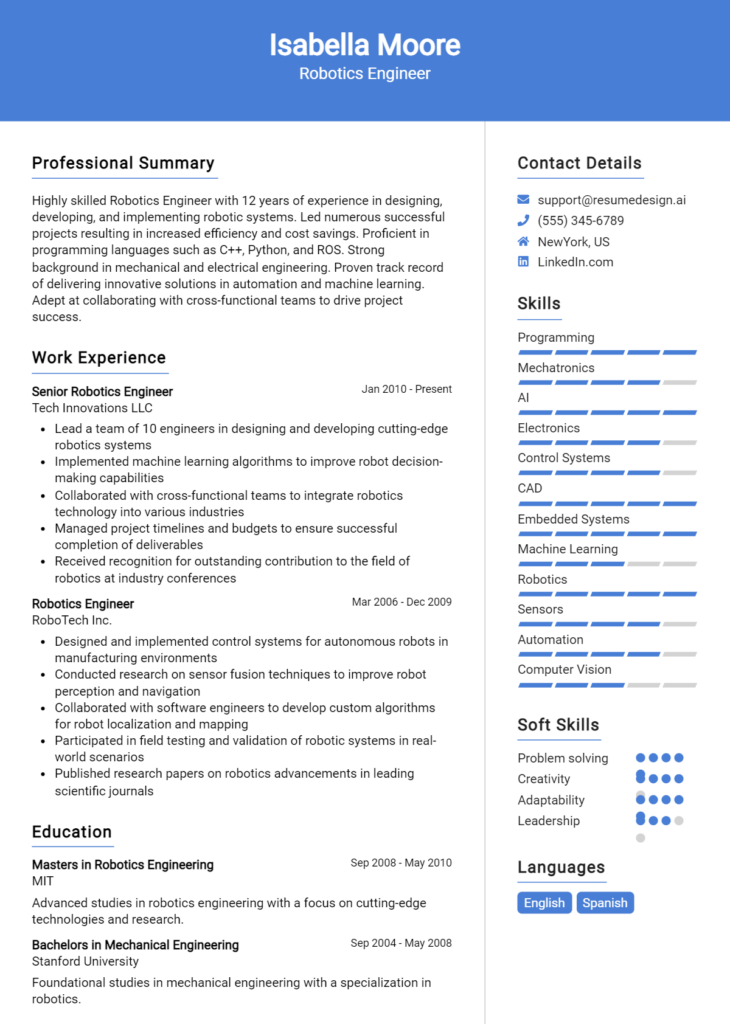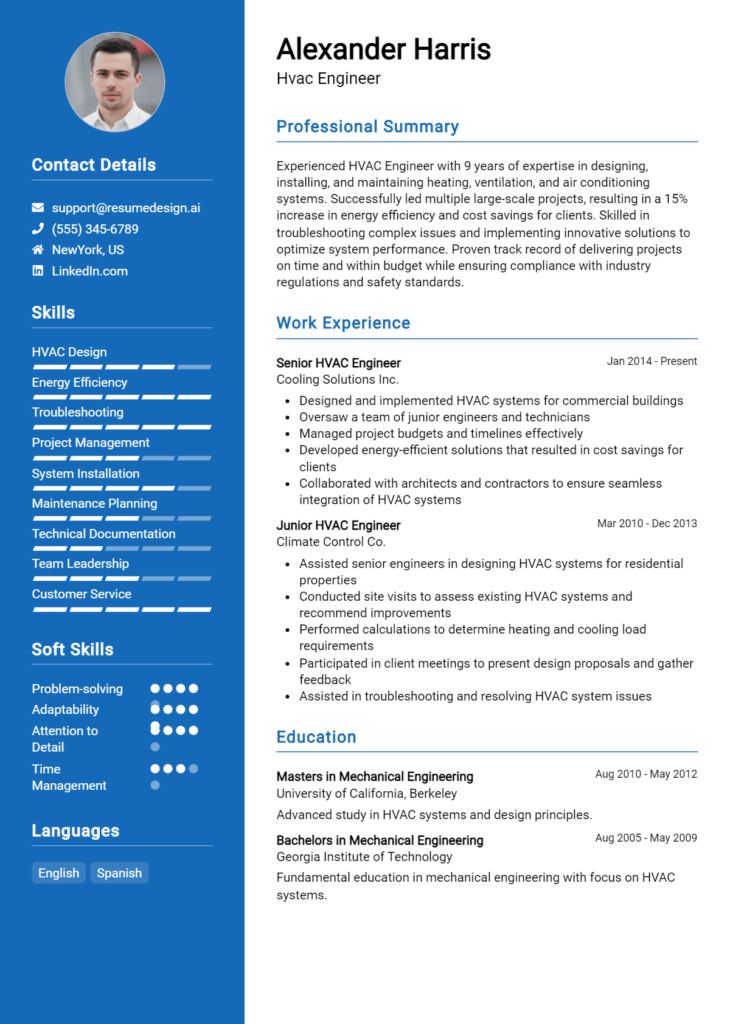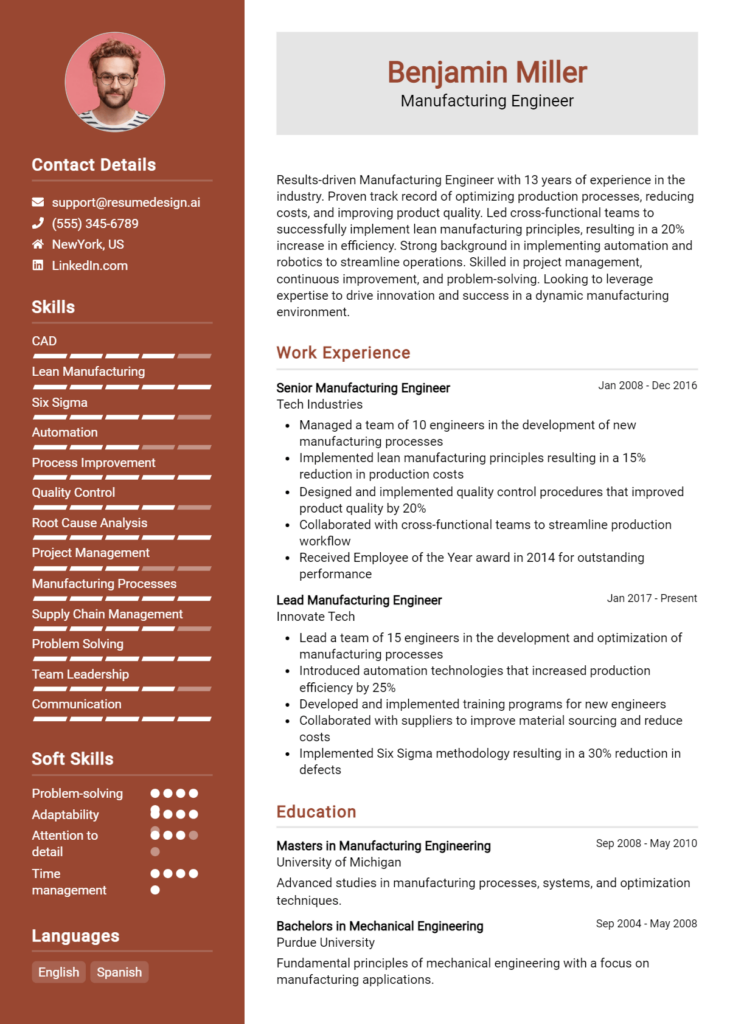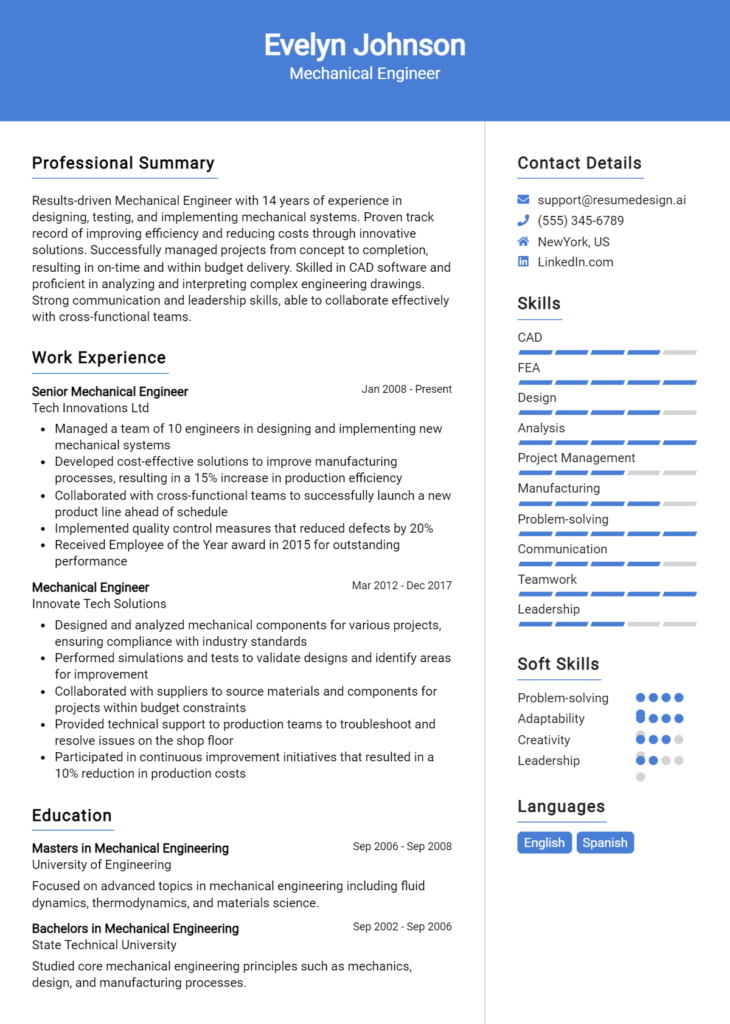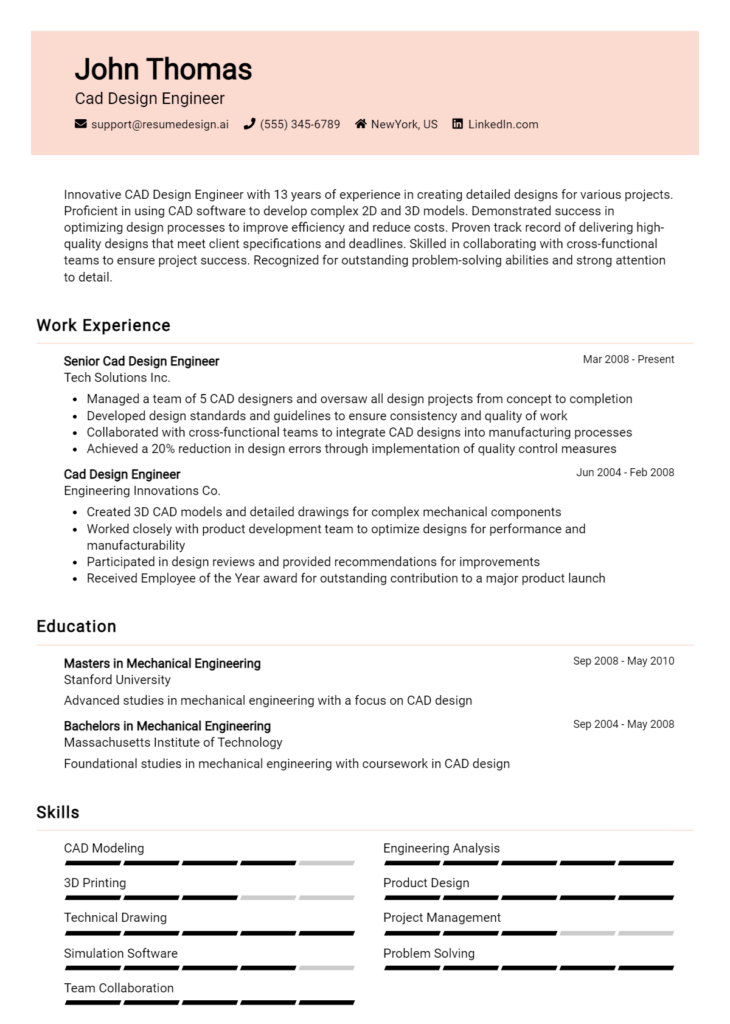Industrial Engineer Core Responsibilities
Industrial Engineers play a crucial role in optimizing complex processes and systems across various departments, ensuring efficiency and productivity. They leverage technical skills in data analysis, operations research, and manufacturing principles while employing strong problem-solving abilities to identify inefficiencies. By fostering collaboration between engineering, production, and management teams, they align operational goals with organizational objectives. A well-structured resume highlights these competencies, effectively showcasing the candidate's potential to drive success within the organization.
Common Responsibilities Listed on Industrial Engineer Resume
- Analyze production processes to identify inefficiencies and recommend improvements.
- Develop and implement workflow and layout designs to optimize operations.
- Conduct time studies and work measurement to enhance productivity.
- Collaborate with cross-functional teams to streamline processes and reduce costs.
- Utilize statistical methods for quality control and process optimization.
- Implement lean manufacturing principles to minimize waste.
- Design and maintain metrics and performance indicators.
- Conduct feasibility studies and cost-benefit analyses for new projects.
- Facilitate training programs on process improvements and best practices.
- Manage projects from conception through implementation and evaluation.
- Prepare detailed reports and presentations for stakeholders.
High-Level Resume Tips for Industrial Engineer Professionals
In the competitive field of industrial engineering, a well-crafted resume serves as a pivotal tool for professionals seeking to make a strong first impression on potential employers. Your resume is often the initial introduction to your skills, experiences, and achievements, making it essential to present a clear and compelling narrative that highlights your qualifications. It should not only showcase your technical expertise but also reflect your problem-solving abilities and contributions to previous projects. This guide will provide practical and actionable resume tips specifically tailored for industrial engineer professionals, helping you to stand out in a crowded job market.
Top Resume Tips for Industrial Engineer Professionals
- Tailor your resume to each job description by incorporating relevant keywords and phrases that match the requirements of the position.
- Highlight your educational background, including relevant coursework and certifications that pertain to industrial engineering.
- Showcase relevant experience by detailing your previous roles, responsibilities, and contributions in a clear and concise manner.
- Quantify your achievements by using metrics and data to demonstrate the impact of your work, such as cost savings or process improvements.
- Include industry-specific skills, such as proficiency in Lean Manufacturing, Six Sigma, or CAD software, to align your qualifications with employer needs.
- Utilize action verbs to describe your experience, making your resume more dynamic and engaging.
- Incorporate a summary statement at the top of your resume that encapsulates your career goals and key competencies.
- Keep your resume to one page, if possible, to ensure clarity and maintain the reader's attention.
- Proofread your resume multiple times to eliminate any grammatical errors or typos, as attention to detail is crucial in engineering roles.
- Consider adding a section for professional affiliations or memberships in engineering organizations to demonstrate your commitment to the field.
By implementing these tips, you can significantly increase your chances of landing a job in the industrial engineering field. A polished and targeted resume not only reflects your qualifications but also showcases your understanding of industry standards, making you a more attractive candidate to potential employers.
Why Resume Headlines & Titles are Important for Industrial Engineer
In the competitive landscape of industrial engineering, a well-crafted resume headline or title can serve as a powerful tool to capture the attention of hiring managers. These succinct phrases encapsulate a candidate's core qualifications and convey their professional identity in a single impactful statement. A strong headline not only highlights the key skills and experiences relevant to the position but also sets the tone for the rest of the resume. It should be concise, relevant, and directly aligned with the job being applied for, ensuring that it resonates with the specific needs of employers in the industrial engineering sector.
Best Practices for Crafting Resume Headlines for Industrial Engineer
- Keep it concise: Aim for a headline that is no longer than one or two phrases.
- Be role-specific: Tailor your headline to reflect the specific position or focus within industrial engineering.
- Highlight key skills: Include essential skills that are directly relevant to the job description.
- Use action-oriented language: Choose dynamic verbs that convey your expertise and impact.
- Incorporate industry keywords: Use terminology that aligns with the job and resonates with hiring managers.
- Showcase accomplishments: Include quantifiable achievements to demonstrate your value.
- Avoid jargon: Make sure your headline is easily understood by all potential readers.
- Be authentic: Reflect your true professional identity and unique selling proposition.
Example Resume Headlines for Industrial Engineer
Strong Resume Headlines
Results-Driven Industrial Engineer with 5+ Years of Experience in Lean Manufacturing
Certified Six Sigma Black Belt Specializing in Process Optimization and Cost Reduction
Innovative Industrial Engineer Focused on Sustainable Solutions and Efficiency Improvements
Dynamic Industrial Engineer with Proven Track Record in Project Management and Quality Assurance
Weak Resume Headlines
Industrial Engineer Looking for Opportunities
Experienced Professional in Engineering
Strong headlines are effective because they immediately convey the candidate's expertise and relevance to the position, making a memorable impression on hiring managers. They provide clear insights into the candidate's skills and accomplishments, prompting employers to delve deeper into the resume. In contrast, weak headlines fail to impress as they lack specificity and do not distinguish the candidate from others. Generic titles do not communicate unique qualifications or value, ultimately diminishing the candidate's chances of standing out in a crowded job market.
Writing an Exceptional Industrial Engineer Resume Summary
A well-crafted resume summary is crucial for Industrial Engineers as it serves as the first impression a hiring manager receives. A strong summary succinctly highlights the candidate's key skills, relevant experience, and notable accomplishments, quickly capturing the attention of potential employers. In a competitive job market, this brief but impactful section can differentiate a candidate from others by showcasing their unique qualifications tailored to the specific job they are applying for. A compelling resume summary not only enhances the visibility of the applicant's expertise but also sets the tone for the rest of the resume.
Best Practices for Writing a Industrial Engineer Resume Summary
- Quantify achievements to demonstrate impact, such as cost savings or efficiency improvements.
- Focus on key skills relevant to the job description, such as Lean Manufacturing, Six Sigma, or process optimization.
- Tailor the summary for each job application to align with the specific requirements and language used in the job posting.
- Keep it concise, ideally between 2-4 sentences, ensuring every word adds value.
- Use action verbs to convey confidence and proactivity.
- Highlight industry-specific certifications or education that enhance credibility.
- Incorporate keywords from the job description to pass through Applicant Tracking Systems (ATS).
- Showcase relevant soft skills, such as problem-solving, teamwork, and communication abilities.
Example Industrial Engineer Resume Summaries
Strong Resume Summaries
Results-driven Industrial Engineer with over 5 years of experience in process optimization and cost reduction. Successfully led a Lean initiative that reduced production waste by 30%, saving the company $200,000 annually.
Detail-oriented Industrial Engineer with a proven track record in implementing Six Sigma methodologies, achieving a 25% increase in production efficiency. Known for strong analytical skills and a commitment to continuous improvement.
Dynamic Industrial Engineer with expertise in project management and supply chain optimization. Spearheaded a cross-functional team project that decreased lead times by 15% and improved customer satisfaction scores by 40%.
Analytical Industrial Engineer with an emphasis on data-driven decision-making. Developed and executed a quality control program that reduced defects by 20%, leading to significant cost savings and improved product quality.
Weak Resume Summaries
Industrial Engineer with experience in various projects and a strong background in engineering principles.
Motivated Industrial Engineer looking for a challenging position to utilize skills and contribute to a company.
The examples provided illustrate the stark contrast between strong and weak resume summaries. Strong summaries are specific, quantifiable, and tailored to highlight relevant skills and accomplishments, making a clear case for the candidate's suitability for the role. In contrast, weak summaries are vague, lacking in measurable outcomes and detail, which fails to capture the interest of hiring managers and does not effectively communicate the candidate's value.
Work Experience Section for Industrial Engineer Resume
The work experience section of an Industrial Engineer resume is a critical component that provides potential employers with a clear insight into the candidate's professional background. This section goes beyond listing job titles and dates; it showcases the candidate's technical skills, ability to manage teams, and proficiency in delivering high-quality products. By quantifying achievements and aligning experiences with industry standards, candidates can effectively demonstrate their value and readiness to contribute to their future roles.
Best Practices for Industrial Engineer Work Experience
- Highlight relevant technical skills and certifications that align with the job description.
- Quantify achievements with specific metrics, such as cost savings, efficiency improvements, or production increases.
- Emphasize leadership roles and experiences managing teams or projects.
- Use action verbs to convey a sense of proactivity and responsibility.
- Tailor descriptions to reflect industry standards and expectations.
- Include collaborative projects that showcase teamwork and cross-functional communication.
- Focus on results and impacts rather than just duties and responsibilities.
- Keep language concise and clear, avoiding jargon that may not be universally understood.
Example Work Experiences for Industrial Engineer
Strong Experiences
- Led a cross-functional team to redesign the production process, resulting in a 20% increase in efficiency and a cost reduction of $150,000 annually.
- Implemented a new inventory management system that decreased stock discrepancies by 30%, improving overall operational accuracy.
- Facilitated a Six Sigma project that reduced manufacturing defects by 25%, enhancing product quality and customer satisfaction ratings.
- Collaborated with R&D to develop a new product line, successfully launching it 3 months ahead of schedule and achieving first-year sales of $1 million.
Weak Experiences
- Responsible for some engineering tasks.
- Worked on various projects that included process improvements.
- Involved in team meetings and discussions.
- Assisted with general engineering duties as needed.
The examples provided illustrate the difference between strong and weak experiences. Strong experiences are characterized by specific, quantifiable outcomes and demonstrate the candidate's ability to lead, innovate, and collaborate effectively within a team. In contrast, weak experiences tend to be vague, lacking measurable results and a clear sense of impact, which does not effectively convey the candidate's qualifications or contributions in their previous roles.
Education and Certifications Section for Industrial Engineer Resume
The education and certifications section of an Industrial Engineer resume plays a crucial role in showcasing a candidate's academic background, industry-relevant certifications, and commitment to continuous learning. This section not only reflects the foundational knowledge gained through formal education but also highlights specialized training and certifications that validate a candidate's expertise in the field. By providing relevant coursework and recognized credentials, candidates can significantly enhance their credibility and demonstrate their alignment with the specific requirements of the job role, making a compelling case for their suitability in a competitive job market.
Best Practices for Industrial Engineer Education and Certifications
- Include only relevant degrees and certifications that pertain to industrial engineering or closely related fields.
- List your highest level of education first, followed by any relevant certifications or specialized training.
- Be specific about your degree titles, including any concentrations or specializations.
- Highlight any industry-recognized certifications, such as Lean Six Sigma or Project Management Professional (PMP).
- Incorporate relevant coursework that aligns with the job description to demonstrate applicable knowledge.
- Update your section regularly to include new certifications or courses to reflect continuous learning.
- Use clear and concise formatting to make this section easy to read and visually appealing.
- Consider including the dates of completion for certifications and degrees to show recent education and training.
Example Education and Certifications for Industrial Engineer
Strong Examples
- Bachelor of Science in Industrial Engineering, University of XYZ, May 2022
- Lean Six Sigma Green Belt Certification, ASQ, June 2023
- Advanced Manufacturing Processes, Completed at University of ABC, January 2021
- Project Management Professional (PMP), PMI, September 2022
Weak Examples
- Bachelor of Arts in English Literature, University of XYZ, May 2020
- Certification in Basic Computer Skills, Online Learning Platform, March 2022
- High School Diploma, ABC High School, June 2018
- Introduction to Philosophy, University of DEF, December 2021
The strong examples are considered effective because they directly relate to the field of industrial engineering and include recognized credentials that enhance the candidate's profile. Each entry reflects relevant education and training that align with the skills needed for the role. Conversely, the weak examples lack relevance to industrial engineering, showcasing degrees and certifications that do not contribute to the candidate's qualifications for the position, which could detract from their overall appeal to potential employers.
Top Skills & Keywords for Industrial Engineer Resume
In the competitive field of industrial engineering, showcasing the right mix of skills on your resume is crucial to stand out to potential employers. A well-crafted resume not only highlights your technical abilities but also emphasizes your interpersonal skills, which are essential for collaboration and problem-solving in diverse teams. By effectively incorporating both hard and soft skills, you can demonstrate your comprehensive expertise and readiness to contribute to optimizing processes, improving efficiency, and enhancing productivity within an organization. For a deeper understanding of how to present your skills effectively, consider exploring more about skills and how to articulate your work experience.
Top Hard & Soft Skills for Industrial Engineer
Soft Skills
- Problem-solving
- Communication
- Teamwork
- Analytical thinking
- Time management
- Adaptability
- Leadership
- Creativity
- Conflict resolution
- Attention to detail
- Critical thinking
- Decision-making
- Interpersonal skills
- Project management
- Customer service orientation
Hard Skills
- Process optimization
- Statistical analysis
- Lean manufacturing
- Six Sigma methodologies
- CAD software proficiency (e.g., AutoCAD)
- Simulation modeling
- Quality control techniques
- Data analysis and interpretation
- Supply chain management
- Production planning
- Cost analysis
- Risk assessment
- ERP software knowledge
- Industrial safety regulations
- Workflow analysis
- Manufacturing processes
- Operations research
Stand Out with a Winning Industrial Engineer Cover Letter
Dear Hiring Manager,
I am writing to express my interest in the Industrial Engineer position at [Company Name] as advertised on [Job Board/Company Website]. With a Bachelor’s degree in Industrial Engineering and over [X years] of hands-on experience in process optimization and project management, I am excited about the opportunity to contribute to your team. My background in analyzing workflows and implementing efficient systems aligns perfectly with [Company Name]'s commitment to innovation and operational excellence.
In my previous role at [Previous Company Name], I successfully led numerous projects that improved production efficiency by over [X%]. By utilizing lean manufacturing principles and data analysis techniques, I was able to identify bottlenecks and recommend solutions that saved the company both time and costs. My ability to collaborate with cross-functional teams and communicate complex ideas clearly has been instrumental in driving these projects to completion. I am particularly drawn to the collaborative culture at [Company Name] and am eager to bring my skills in problem-solving and process improvement to help achieve your operational goals.
Moreover, my proficiency in various engineering software, including AutoCAD and MATLAB, allows me to create detailed simulations and models that inform decision-making. I am passionate about continuous learning and stay current with industry trends and technologies to ensure that my contributions remain impactful. I am excited about the possibility of working at [Company Name] and am confident that my expertise will help enhance your operational strategies and drive success.
Thank you for considering my application. I look forward to the opportunity to discuss how my skills and experiences align with the needs of your team. I am eager to bring my passion for industrial engineering to [Company Name] and contribute to your ongoing success.
Sincerely,
[Your Name]
[Your Phone Number]
[Your Email Address]
Common Mistakes to Avoid in a Industrial Engineer Resume
Crafting a compelling resume is essential for industrial engineers seeking to make a strong impression in a competitive job market. However, many candidates fall into common pitfalls that can undermine their chances of landing an interview. Avoiding these mistakes can enhance the effectiveness of your resume and showcase your qualifications and skills more clearly. Here are some common mistakes to steer clear of:
Generic Objective Statements: Using a vague objective statement that lacks specificity about your career goals and how they align with the position can make your resume less impactful. Tailor your statement to reflect your aspirations and the unique value you bring to the role.
Overloading with Jargon: While technical terms are important in engineering, overloading your resume with jargon can alienate hiring managers who may not be familiar with every acronym or technical term. Strive for clarity and ensure that your accomplishments are understandable.
Neglecting Quantifiable Achievements: Failing to include quantifiable results of your work can lead to a missed opportunity to demonstrate your impact. Use metrics to highlight your contributions, such as cost savings, efficiency improvements, or project completion times.
Irrelevant Experience: Including unrelated jobs or experiences can clutter your resume and distract from your engineering qualifications. Focus on relevant roles and skills that showcase your industrial engineering expertise.
Inconsistent Formatting: A resume that lacks consistent formatting can appear unprofessional and make it difficult for hiring managers to read. Ensure uniform font sizes, bullet points, and spacing throughout your document for a polished presentation.
Omitting Soft Skills: Industrial engineering is not just about technical abilities; soft skills like teamwork, communication, and problem-solving are equally important. Be sure to highlight these skills and provide examples of how you've applied them in your work.
Ignoring the Job Description: Failing to tailor your resume to the specific job description can result in missing keywords that employers are looking for. Customize your resume to match the skills and experiences that the employer has highlighted.
Spelling and Grammar Errors: Typos or grammatical mistakes can create a negative impression and suggest a lack of attention to detail. Thoroughly proofread your resume or have someone else review it to catch any errors before submission.
Conclusion
In summary, the role of an Industrial Engineer is critical in optimizing complex processes and systems to enhance productivity and efficiency across various industries. Key responsibilities include analyzing workflows, designing systems, and implementing solutions that reduce waste and improve quality. As the demand for skilled Industrial Engineers continues to grow, it's essential to ensure that your resume effectively highlights your skills, experiences, and achievements in this field.
To make a strong impression on potential employers, take the time to review and update your Industrial Engineer resume. Utilize available resources to elevate your application. Explore a variety of resume templates that can help structure your information clearly and professionally. Consider using a resume builder for a user-friendly experience that guides you through the process of crafting your resume. Additionally, look at resume examples to gain inspiration and ideas on how to present your background effectively. Lastly, don’t overlook the importance of a compelling cover letter; check out the cover letter templates available to ensure you make a strong case for your candidacy.
Take action today – refine your resume and enhance your job prospects as an Industrial Engineer!

